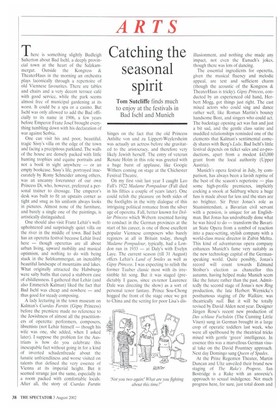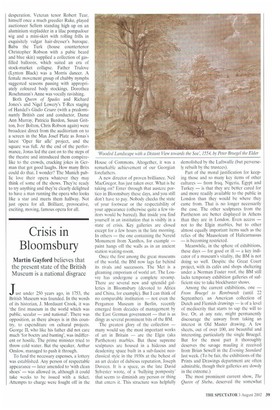Catching the seasonal spirit
Tom Sutcliffe finds much to enjoy at the festivals in Bad Ischl and Munich
There is something slightly Budleigh Salterton about Bad Ischl, a deeply provincial town at the heart of the Salzkammergut. Outside the Kongress & TheaterHaus in the morning an orchestra plays laconically through a repertoire of old Viennese favourites. There are tables and chairs and a very decent terrace cafe with good service, while the park seems almost free of municipal gardening at its worst. It could be a spa or a casino. But Ischl was only allowed to add the Bad officially to its name in 1906, a few years before Emperor Franz Josef brought everything tumbling down with his declaration of war against Serbia.
One can visit his and poor. beautiful, tragic Sissy's villa on the edge of the town and facing a precipitous parkland. The walls of the house are densely packed with little hunting trophies and equine portraits and not a book in sight anywhere — or an empty bookcase. Sissy's life, portrayed inaccurately by Romy Schneider among others, was an uncanny forerunner of our own Princess Di, who, however, preferred a personal trainer to dressage. The emperor's desk was built to fit an upstairs corner as tight and snug as his uniform always looks in pictures. Almost none of the furniture, and barely a single one of the paintings, is artistically distinguished.
One should also visit Franz Lehar's wellupholstered and surprisingly quiet villa on the river in the middle of town. Bad Ischl has an operetta festival because Lehar lived here — though operettas are all about urban living, upward mobility and musical optimism, and nothing to do with being stuck in the Salzkammergut, an incredibly beautiful landscape of mountains and lakes. What originally attracted the Habsburgs were salty baths that cured a stubborn case of childlessness. I gathered that Lehar (and also Emmerich Kalman) liked the fact that Bad Ischl was cheap and nowhere — and thus good for steady composing.
A lady lecturing in the town museum on Kalman's Csardas Furstin (Gipsy Princess) before the premiere made no reference to the Jewishness of almost all the practitioners of operetta: performers, composers, librettists (not Lehar himself — though his wife was one, she added, when I asked later). I suppose the problem for the Austrians is how do you celebrate this inescapable fact without going in for a kind of inverted schadenfreude about the lunatic unfriendliness and worse visited on talents that defined the very essence of Vienna at its imperial height. But it seemed strange just the same, especially in a room packed with comfortable locals. After all, the story of Csardas Furstin hinges on the fact that the old Princess Anhilte von und zu Lippert-Weylersheim was actually an actress before she gravitated to the aristocracy, and therefore very likely Jewish herself. The entry of veteran Renate Holm in this role was greeted with a huge burst of applause, like Googie Withers coming on stage at the Chichester Festival Theatre.
On my first visit last year I caught Leo Fall's 1922 Madame Pompadour (Fall died in his fifties a couple of years later). One could relish the pleasure on both sides of the footlights in the witty dialogue of this intriguing political romance from the silver age of operetta. Fall, better known for Dollar Princess which Webern resented having to conduct in the German provinces at the start of his career, is one of those excellent popular Viennese composers who barely registers at all in Britain today, though Madame Pompadour, typically, had a London run in 1933 — at Daly's with Evelyn Laye. The current season (till 31 August) offers Lehar's Land of Smiles as well as Gipsy Princess. I was expecting to relish the former Tauber classic most with its irresistible hit song. But it was staged (predictably I guess, since ex-tenor Laurence Dale was directing the show) as a sort of personal tenor fantasy. Prince Sou-Chong hogged the front of the stage once we got to China and the setting for poor Lisa's dis
illusionment, and nothing else made any impact, not even the Eunuch's jokes, though there was lots of dancing.
The essential ingredients for operetta, given the musical fluency and melodic appeal, are text and sufficient charm (though the acoustic of the Kongress & TheaterHaus is tricky). Gipsy Princess, conducted by an experienced old hand, Herbert Mogg, got things just right. The cast mixed actors who could sing and dance rather well, like Roman Martin's bouncy handsome Boni, and singers who could act. The backstage opening act was fun and just a bit sad, and the gentle class satire and muddled relationships reminded one of the elements that Kalman's sentimental comedy shares with Berg's Lulu. Bad Ischl's little festival depends on ticket sales and co-productions, apart from a modest £43,000 grant from the local authority (Upper Austria).
Munich's opera festival in July, by comparison, has always been a lavish reprise of the best of the season's repertoire — plus some high-profile premieres, implicitly cocking a snook at Salzburg where a huge fuss is made about far less and the stars are no brighter. Sir Peter Jonas's role as Staatsintendant, a Bavarian civil servant with a pension, is unique for an Englishman. But Jonas has undoubtedly done what he was hired to do — transform the Bavarian State Opera from a symbol of reaction into a pace-setting, stylish company with a world-class music director in Zubin Mehta. This kind of adventurous opera company enhances Munich's fame very suitably as the new technology capital of the Germanspeaking world. Quite possibly, Jonas's record will count towards Edmund Stoiber's election as chancellor this autumn, having helped make Munich seem like the future rather than the past. Admittedly the second stage of Jonas's new Ring production, the late Herbert Wernicke's posthumous staging of Die Walkiire, was theatrically null. But it will be totally revised by David Alden next year. Designer Jiirgen Rose's recent new production of Das schlaue Fuchslein (The Cunning Little Vixen) sung in German brought in a large crop of operatic toddlers last week, who were all spellbound by the theatrical tricks mixed with gentle 'green' intelligence. In essence this was a marvellous German visual take on the David Pountney approach. Next day Domingo sang Queen of Spades.
At the Prinz Regenten Theater, Martin Duncan and Ultz unveiled their brand new staging of The Rake's Progress, Ian Bostridge is a Rake with an anorexic's approach to sexual indulgence. Not much progress here, for sure, just total doom and desperation. Veteran tenor Robert Tear, himself once a much greedier Rake, played auctioneer Sellem standing high up on an aluminium stepladder in a lilac pompadour wig and a mini-skirt with rolling frills in exquisitely vulgar hair-dresser's baroque. Baba the Turk (house countertenor Christopher Robson with a pubic beard and blue skin) supplied a collection of gasfilled balloons, which suited an era of stock-market collapse. Father Trulove (Lynton Black) was a Morris dancer. A female movement group of chubby nymphs suggested seasons passing with appropriately coloured body stockings. Dorothea Roschmann's Anne was vocally ravishing.
Both Queen of Spades and Richard Jones's and Nigel Lowery's T-Rex staging of Handers Giulio Cesare (with a predominantly British cast and conductor, Dame Ann Murray, Patricia Bardon, Susan Gritton, Ivor Bolton, Chris Robson again) were broadcast direct from the auditorium on to a screen in the Max Josef Platz as Jonas's latest 'Oper für all& project, and the square was full. At the end of the performance, Jonas led the cast on to the steps of the theatre and introduced them comperelike to the crowds, cracking jokes in German that got good laughs. How many Brits could do that, I wonder? The Munich public love their opera whatever they may think of some of the shows. They're ready to try anything and they're clearly delighted to have a man running the opera who looks like a star and meets them halfway. Not just opera for all. Brilliant, provocative, exciting, moving, famous opera for all.



























































 Previous page
Previous page